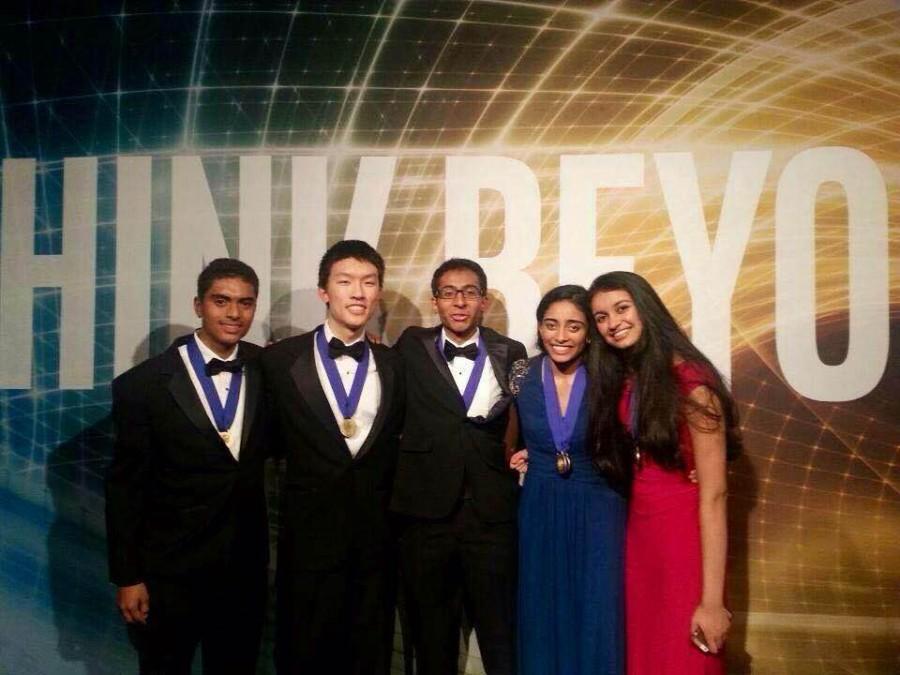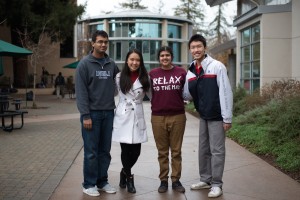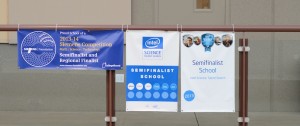Intel STS finalist travels to Washington D.C.
Provided by Jonathan Ma
Jonathan Ma (12) poses with four other finalists from the Bay Area at Washington DC for the Intel Science Talent Search (STS). STS started in 1942 and is the most prestigious high school research competition. Jonathan’s project involved predicting cancer drug responses with machine-learning.
March 25, 2016
Senior Jonathan Ma, who was named an Intel Science Talent Search (STS) finalist on Jan. 20, traveled to Washington, D.C., to meet with judges and 39 other finalists from March 10 to March 16.
Jonathan, who did not win any awards at the event, was also one of 300 semifinalists recognized by Intel STS on Jan. 6, along with seniors Vineet Kosaraju, Sophia Luo and Sadhika Malladi.
Jonathan was named a finalist for his project, “Genomics-Based Cancer Drug Response Prediction through the Adaptive Elastic Net.”
“My project was the application of a machine learning algorithm that can take advantage of relationships between chemotherapeutics to more accurately model responses to chemical drugs,” Jonathan said prior to the event. “I wasn’t expecting to be named a finalist, but I feel very honored to have gotten this award, and now I’m very excited to meet the other 39 participants in D.C.”
Jonathan has had expansive past experience in science fairs and was named a Siemens finalist last year.
“Before this, I went to Intel ISEF, the Intel International Science and Engineering Fair, in 2015 and the Siemens regional finals in 2014, and those are both in essence pretty similar to what you do,” he said. “The format’s different, but in essence you’re presenting your position to judges who ask questions of you and then judge you based on your presentation and your responses to those questions. I feel like it’s just an incredible opportunity to share your research with the judges and with other talented peers.”
Anita Chetty, upper school science department chair, has followed Jonathan’s career because of his passion for research.
“In my involvement with the research program, I have been following Jonathan’s growth as a researcher because I think the one thing that Jonathan has done is he has sought out opportunities for himself that allowed him to stretch and grow as a student researcher,” Chetty said. “I think that if you follow the way that Jonathan has done it, that really shows someone who found his passion early. He let his interest drive what he ultimately did, so he wasn’t just getting an internship for the sake of getting any internship; he first focused on what he was interested in and let everything else drive that.”
The Upper School has had a long history of STS participation.
“In the infancy of the research program, we set [the STS] as a target for ourselves,” Chetty said. “I really believe that Intel STS is not just a prize that our students win at the end of a year and that it’s an achievement for that individual. It actually has been much more than that: it has spawned this incredible research program that you see now; it gave our students an opportunity.”


















![“[Building nerf blasters] became this outlet of creativity for me that hasn't been matched by anything else. The process [of] making a build complete to your desire is such a painstakingly difficult process, but I've had to learn from [the skills needed from] soldering to proper painting. There's so many different options for everything, if you think about it, it exists. The best part is [that] if it doesn't exist, you can build it yourself," Ishaan Parate said.](https://harkeraquila.com/wp-content/uploads/2022/08/DSC_8149-900x604.jpg)




![“When I came into high school, I was ready to be a follower. But DECA was a game changer for me. It helped me overcome my fear of public speaking, and it's played such a major role in who I've become today. To be able to successfully lead a chapter of 150 students, an officer team and be one of the upperclassmen I once really admired is something I'm [really] proud of,” Anvitha Tummala ('21) said.](https://harkeraquila.com/wp-content/uploads/2021/07/Screen-Shot-2021-07-25-at-9.50.05-AM-900x594.png)







![“I think getting up in the morning and having a sense of purpose [is exciting]. I think without a certain amount of drive, life is kind of obsolete and mundane, and I think having that every single day is what makes each day unique and kind of makes life exciting,” Neymika Jain (12) said.](https://harkeraquila.com/wp-content/uploads/2017/06/Screen-Shot-2017-06-03-at-4.54.16-PM.png)








![“My slogan is ‘slow feet, don’t eat, and I’m hungry.’ You need to run fast to get where you are–you aren't going to get those championships if you aren't fast,” Angel Cervantes (12) said. “I want to do well in school on my tests and in track and win championships for my team. I live by that, [and] I can do that anywhere: in the classroom or on the field.”](https://harkeraquila.com/wp-content/uploads/2018/06/DSC5146-900x601.jpg)
![“[Volleyball has] taught me how to fall correctly, and another thing it taught is that you don’t have to be the best at something to be good at it. If you just hit the ball in a smart way, then it still scores points and you’re good at it. You could be a background player and still make a much bigger impact on the team than you would think,” Anya Gert (’20) said.](https://harkeraquila.com/wp-content/uploads/2020/06/AnnaGert_JinTuan_HoHPhotoEdited-600x900.jpeg)

![“I'm not nearly there yet, but [my confidence has] definitely been getting better since I was pretty shy and timid coming into Harker my freshman year. I know that there's a lot of people that are really confident in what they do, and I really admire them. Everyone's so driven and that has really pushed me to kind of try to find my own place in high school and be more confident,” Alyssa Huang (’20) said.](https://harkeraquila.com/wp-content/uploads/2020/06/AlyssaHuang_EmilyChen_HoHPhoto-900x749.jpeg)













